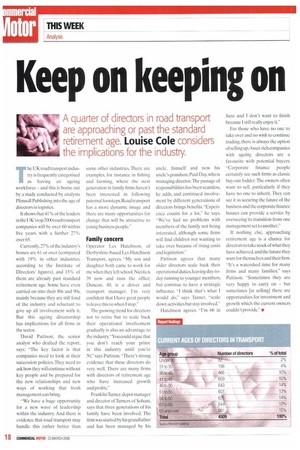Keep on keeping on
Page 18

If you've noticed an error in this article please click here to report it so we can fix it.
A quarter of directors in road transport are approaching or past the standard retirement age. Louise Cole considers the implications for the industry.
The UK road transport industry is frequently categorised as having an ageing workforce — and this is borne out by a study conducted by analysts Plimsoll Publishing into the age of directors in logistics.
It shows that 41% of the leaders in the UK's top 2000 road transport companies will be over 60 within five years, with a further 27% over 65.
Currently, 27% of the industry's bosses are 61 or over (compared with 19% in other industries, according to the Institute of Directors' figures), and 15% of them are already past standard retirement age. Some have even carried on into their 80s and 90s, mainly because they are still fond of the industry and reluctant to give up all involvement with it. But this ageing directorship has implications for all firms in the sector.
David Pattison, the senior analyst who drafted the report, says: —The key factor is that companies need to look at their succession policies. They need to ask how they will continue without key people and be prepared for the new relationships and new ways of working that fresh management can bring.
-We have a huge opportunity for a new wave of leadership within the industry. And there is evidence that road transport may handle this rather better than some other industries. There are examples. for instance in fishing and farming, where the next generation in family firms haven't been interested in following paternal footsteps. Road transport has a more dynamic image and there are many opportunities for change that will be attractive to young business people."
Family concern
Operator Les Hutchison. of Derbyshire-based Les Hutchison Transport, agrees. "My son and daughter both came to work for me when they left school. Nicola is 39 now and runs the office; Duncan. 40, is a driver and transport manager. I'm very confident that I have great people to leave this to when I stop, The growing trend for directors not to retire but to scale back their operational involvement gradually is also an advantage to the industry.-You could argue that you don't reach your prime in this industry until you're 50," says Pattison, "There's strong evidence that these directors do very well. There are many firms with directors of retirement age who have increased growth and profits."
Franklin Turner, depot manager and director of Turners of Soham, says that three generations of his family have been involved. The firm was started by his grandfather and has been managed by his uncle, himself and now his uncle's grandson. Paul Day, who is managing director.The passage of responsibilities has been seamless, he adds, and continued involvement by different generations of directors brings benefits. "Experience counts for a lot," he says. "We've had no problems with members of the family not being interested, although some firms will find children not wanting to take over because of rising costs and legislation."
Paulson agrees that many older directors scale back their operational duties, leaving day-today running to younger members, but continue to have a strategic influence. "I think that's what I would do," says Turner, "scale down activities but stay involved."
Hutchison agrees. "I'm 66 in June and I don't want to finish because !still really enjoy it."
For those who have no one to take over and no wish to continue trading, there is always the option of selling up. A sse t-rich companies with ageing directors are a favourite with potential buyers. "Corporate finance people certainly see such firms as classic buy-out fodder. The owners often want to sell, particularly if they have no one to inherit. They can see it as securing the future of the business and the corporate finance houses can provide a service by overseeing its transition from one management set to another.
If nothing else, approaching retirement age is a chance for directors to take stock of what they have achieved, and the future they want for themselves and their firm. "It's a watershed time for many firms and many families," says Pattison. "Sometimes they are very happy to carry on — but sometimes [in selling] there are opportunities for investment and growth which the current owners couldn't provide." •




































































































































































































